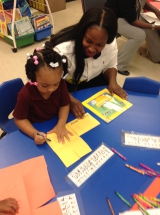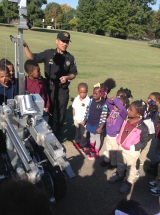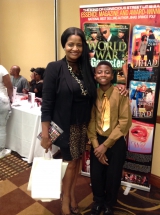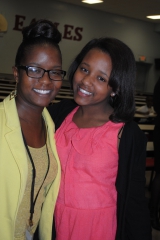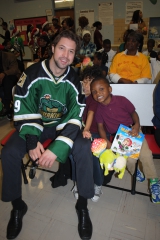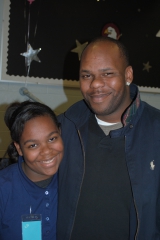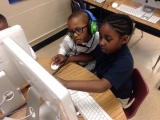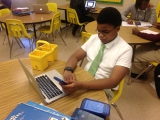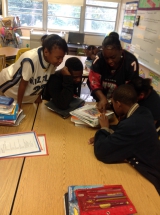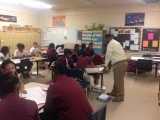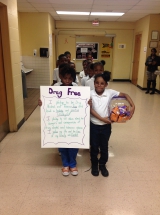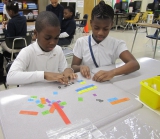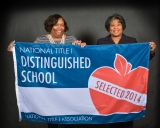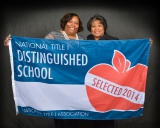-
Category 2
Selected in 2014
-
Grades: pre k - 8
School Setting: urban
Town Population: 897
Student Enrollment: 572
Student Demographics:
Black/African American: 99%
Teacher/Student Ratio: 1:24
White/Caucasian: 1%
Hispanic: 0%
Hawaiian/Pacific Islander: 0%
Asian: 0%
Native American: 0%
Other: 0%
% Reduced Lunch: 99%
% ELL Learners: 1%
Founded: 1802 -
PRINCIPAL:
Lisa M. Frieson -
CONTACT:
1037 Cummings Street
Memphis, TN 38106
901-416-7810
friesonlm@scsk12.org
Cummings School
Memphis, TN
Community stakeholders, parents and teachers attended 10 weeks of classes designed to strengthen the home-school connection. During these sessions, parents and teachers were able to directly address the gaps that may have hindered the relationship.
- Describe specific programs in place to ensure that families are involved in the success of your school and students.
- At Cummings, there are a range of programs that are in place to ensure that families are involved in the success of the school and students. The annual Literacy Extravaganza is used bring literacy to the forefront. At this program, the school works to inspire the whole community to help promote literacy and share the importance of reading everyday. Secondly, our school uses Family School Night (twice a year) as a mechanism to model for parents how to assist their children at home. Teachers create workstations related to all content areas in the school’s auditorium. Parents and students are allowed to rotate through the auditorium gaining insight in reading, math, science, and social studies.
- Describe the most successful activity your school has initiated to strengthen ties to your community.
- The most successful activity our school has initiated to strengthen ties to the community is ‘Parent Power’ classes. Community stakeholders, parents and teachers attended 10 weeks of classes designed to strengthen the home-school connection. During these sessions, parents and teachers were able to directly address the gaps that may have hindered the relationship. Participants were able to collaborate to address misconceptions and the needs of the students. Parents were able to speak freely without being judged. Community stakeholders were able to discuss community resources that are available to help students achieve and parents become more successful in helping their children. Ultimately, these sessions enabled parents and teachers to set aligned goals. After completion of the classes, parents were recognized during a ceremony.
- Describe your philosophy of school change or improvement.
- The single most important factor in school improvement is building a strong support effort through community partnerships. These partnerships have allowed us to enhance the achievement of students through donations, volunteers, resources, and community input.
- What are your school’s top two goals for the next year?
- Our overall goal for the next year is increasing student achievement. We believe all students can and will learn. Therefore, we promote student growth to the fullest, celebrating every small step taken.
- What is the single most important factor in the success of your school that others could replicate?
- The most important factor that could be replicated is the ability to motivate students. It is believed by many that students who live in impoverished areas lack drive and motivation when it comes to learning. However, we believe that when students are motivated then disparities in learning gaps and behavioral issues become smaller. Thus, greatly impacting learning and culture.
- Describe the program or initiative that has had the greatest positive effect on student achievement, including closing achievement or opportunity gaps, if applicable.
- The program that has had the greatest positive effect on student achievement and closing the achievement gaps is our afterschool tutoring, volunteer tutoring program, and our Saturday school program. Within each of these programs, students are given extended opportunities to participate in tutorial components that emphasize reading and math. Some teachers are paid tutors, however many volunteer their time to tutors students who are deficient in core content skills. Teachers are able to provide critical assistance in non-proficient areas and students are able to transfer skills learned to regular classroom instruction. Saturdays are even used to strategically target skills and standards that tend to be difficult areas for students to be successful.
- Explain how Title I funds are used to support your improvement efforts.
- Title I funds are crucial to the success of our students. Funds are used for additional school personnel, to supplement instructional equipment, materials and supplies needed to enhance classroom instruction. In addition, funds have been used to support extended learning opportunities for tutoring and purchase technology to enhance classroom instruction in the 21st century.
- Identify the critical professional development activities you use to improve teaching and student learning.
- We believe the most successful professional development activities are that focus on sharing strategic and successful strategies with one another. We believe before you can improve your teaching, you must improve your understanding of the content that you are teaching. Therefore, our teachers are involved in differentiated professional learning that improves teaching and learning. Novice teachers are involved in a Teacher Effectiveness Program that utilizes the administration and master teachers to model effective teaching, organizational practices and data usage. Teacher meet monthly to discuss professional strategies to improve teacher effectiveness. Also, our school is involved in Professional Book Studies throughout the year, which enhances our professional knowledge of students and instruction.
- Describe how data is used to improve student achievement and inform decision making.
- Data is used consistently by the school staff to improve student achievement and inform instructional decisions. All instruction is data driven. Ultimately, data is used to plan effective instruction, make lesson adjustments and refine lesson delivery. Student progress is tracked and intervention, extension, and enrichment are determined through analyzing student data. Grade level and content area data meetings are used as an avenue to view student work, outline the strengths and weaknesses of student content mastery and to share teaching strategies. During weekly PLCs and vertical team meetings, teacher become actively immerse with student work samples and data results from common assessments to analyze and evaluate.
- Describe your school culture and explain changes you’ve taken to improve it.
-
Cummings School’s culture can be summed with our school’s mantra. We are the school “Where Education Is Everybody’s Business”. Our school culture is one where no one is allowed to quit or fall short of doing their part. The administration and staff make a deliberate effort to set positive norms and establish goal-oriented beliefs. Participation, completion and excellence is the expectation for teachers, students, and community stakeholders. It is ultimately everyone’s responsibility to make sure that students are successful. Every stakeholder takes an active role in ensuring success.
We use a variety of strategies to ensure that we create a continuous cycle for improvement. Stakeholders, parents, students and staff members are surveyed frequently and feedback is used to adjust and monitor the needs of the school in order to improve. Parents actively serve on the school-based decision making council and other school committees that help to gauge the pulse of the school culture.
Stats
-
Category 2
Selected in 2014
-
Grades: pre k - 8
School Setting: urban
Town Population: 897
Student Enrollment: 572
Student Demographics:
Black/African American: 99%
Teacher/Student Ratio: 1:24
White/Caucasian: 1%
Hispanic: 0%
Hawaiian/Pacific Islander: 0%
Asian: 0%
Native American: 0%
Other: 0%
% Reduced Lunch: 99%
% ELL Learners: 1%
Founded: 1802 -
PRINCIPAL:
Lisa M. Frieson -
CONTACT:
1037 Cummings Street
Memphis, TN 38106
901-416-7810
friesonlm@scsk12.org


